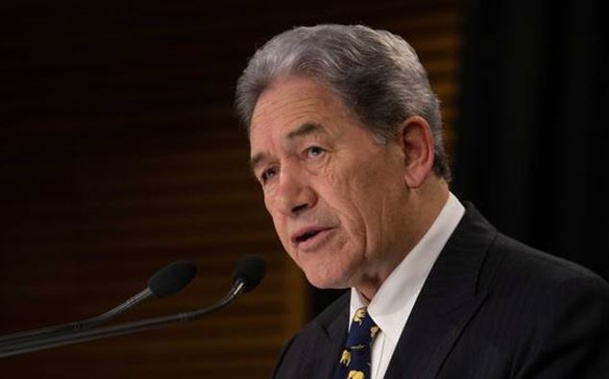
The Government rejected advice to close New Zealand's border to anyone coming to the country amid the Covid-19 crisis, it has been revealed.
"The Ministry of Health recommended a total shutdown of the border, including to returning New Zealanders," Foreign Affairs Minister Winston Peters revealed in a speech this afternoon.
"From its health perspective this was understandable and appropriate advice," Peters said.
"But the Coalition Cabinet rejected that advice because it was and is inconceivable that we will ever turn our backs on our own."
Peters said the Ministry of Health was pushing strongly for the closure of borders - including to New Zealanders seeking to return home.
But Ministry of Foreign Affairs (Mfat) officials pushed back hard on the suggestion.
Kiwis overseas would have "never forgotten" if the Government had turned its back on New Zealanders in other countries.
Peters said that if the border was shut down to returning Kiwis "they would have had a right to think their country has forsaken them".
The people who have been brought home should be thanking the New Zealand taxpayer, Peters said.
He said Cabinet considered the tens of thousands of New Zealanders overseas when the Ministry of Health pitched the idea.
Health officials were advising MPs to close the border for "as long as was needed".
Peters said Cabinet ministers respected the idea, but it was ultimately shot down.
Peters rejected that New Zealand was too slow to close the borders.
The Government's budget for repatriation flights was "many, many, many millions of dollars" but the final numbers are being worked through now.
Peters said the Government's number one goal was making sure that quarantine was successful.
"I think we can look back and say it worked seriously well."
NZ's foreign and trade policies for future
In a speech this afternoon delivered to reporters in the Beehive, Peters said the Government was considering its foreign and trade policy priorities, in light of the global pandemic.
"Especially how we can achieve a foreign and trade policy recovery," he said.
"We need to be focused on how New Zealand positions itself in the new normal emerging following the arrival of Covid-19."
Peters is also dismissing criticism that the Government did too little too late to combat Covid-19.
He said that, globally speaking, New Zealand went hard and it went early.
"International comparisons reveal that New Zealand was extremely unusual in closing our borders to foreigners and in implementing a lockdown before we had lost a single person to Covid-19."
He added that very few countries did this.
Allowing foreigners to leave NZ
Peters said the managed exit of foreign citizens stranded in New Zealand was another complex decision.
"One of the underpinnings of relations between nations is reciprocity. That is, we expect other countries to help return our people to New Zealand – so it would be wrong and dangerous to prevent foreign nationals from leaving here.
"Cabinet rightly decided that, despite advice raising risks about the potential negative health consequences of such a decision, we needed to safely manage the exit of foreign
nationals. So we did."
Around 45,000 foreign nationals departed our shores during the level 4 lockdown.
Peters thanked New Zealand's diplomats and the country's foreign affairs agency (Mfat) for its response to the challenges faced during the pandemic.
He said this has been the largest and most complex consular operation in Mfat's 77-year-history.
"Since this crisis hit, Mfat staff have been working 24/7 to ensure Kiwis stranded offshore get the support they need."
In fact, Peters said that in the past three months, Mfat had provided consular advice to 4500 New Zealanders.
That compares to 700 in the same period last year.
"This has also been the most complex consular response a New Zealand government has ever attempted – because rules around lockdowns, border crossings, transits and flight links are changing every minute of every day."
Meanwhile, he said that since the beginning of the outbreak, New Zealand has engaged in very active diplomacy.
"As Foreign Minister, calls have taken place with my counterparts from 23 countries around the globe to grapple with complex issues around border controls, repatriation and transits.
"This active diplomacy has been premised on the idea that no single country has a monopoly on wisdom and we can make New Zealanders safer by learning from the experiences of others."
NZ's future in global economy
In a ministerial statement in the House yesterday, Peters was critical of globalisation.
"The global industrial system is in massive shock. The longer the pandemic prevails, the greater the probability that all sorts of unforeseen second-order disruption will kick in as the global economy unravels," he said.
He added that the Covid-19 pandemic has exposed the fragility and the vulnerability inherent in the highly interconnected and networked global economy.
And he said that New Zealand needs to seriously think about its future in the transformed global economy.
"If there is to be an overseas investment, which is a good thing, it must be in terms of the New Zealand economy's needs, the New Zealand people's interests, and building resilience by means of our - not foreign - ownership."
He told Newstalk ZB this morning if products can be manufactured locally within 15 per cent of the global price, they have to be made here.
"As it started to unravel, we brought in the biggest welfare support system to try and disguise it, called family support.
"It's better if we stick to our knitting like Singapore and the Scandinavian countries."
Take your Radio, Podcasts and Music with you









